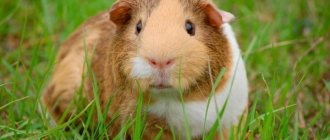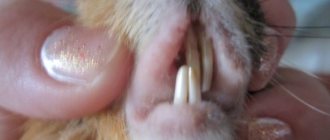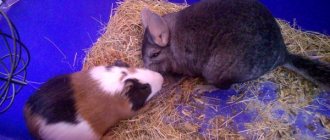- home
- Guinea pig
- General information about guinea pigs
02/06/2019 Guinea pigs are sensitive to changes in voice intonation.
They are able to recognize when the owner is angry or when he wants to play with him. Pets have excellent hearing and are able to express emotions and desires using a range of sounds. You don't need to be a wizard to understand what guinea pigs are talking about. It is enough to listen carefully to your pet.
Hums
Rumbling sounds can have a variety of meanings, depending on the position you are currently occupying. If the pig is currently feeling content and happy, then it will emit a guttural rumbling against the background of absolute relaxation and ease. However, if the rumbling sounds have a higher pitch, then the animal is most likely irritated by something. Tension in movements will also indicate this. If you take a closer look at the pet, you can see that it trembles while purring. But abrupt rumbling sounds clearly indicate that your pig is scared or feels uncomfortable.
Grinding/chattering of teeth
Why does a guinea pig chatter its teeth? Most often this is a bad sign. A pet can express its dissatisfaction and even anger in this way. If an animal makes hissing sounds by clicking its teeth or shows its teeth, then you can be sure that the animal is aggressive.
Grinding or chattering of teeth can be a warning sign of a fight. If pigs are kept together, they can arrange a division of territory or a showdown. It is better to accustom the animal to the neighborhood gradually. First, give the animals the opportunity to only hear each other. After a couple of weeks, the pigs can be placed in the same room. After some time, the rodents will be ready to live together.
When a pet has no conflicts with its relatives, and there are no obvious reasons for its anger, then it is worth checking the state of its health.
Rodents often chatter their teeth when they have an upset stomach.
A conflict is brewing - maybe growl at him?
Grinding can occur due to overgrowth of teeth, insufficient grinding of them on solid food and toys. A dental defect can cause infection or deterioration. Therefore, you should visit a veterinarian without delay.
Squeals or whines
A squeal is a high-pitched squeak that unmistakably signals that your pet is feeling unwell and is overcome by fear and pain. If you hear this sound, be sure to check on your pets to make sure they are okay and no one was hurt. By whining or moaning, guinea pigs want to tell their owners about their irritation or dislike for something or someone, for example, their brothers.
Decoding the movements of a guinea pig
As was said, it is easiest to decipher the sound signals given by pets if we consider them in inextricable connection with the movements of the animals. Body language, therefore, is no less important in the communication process than vocal communication, because the same sound, depending on the circumstances, can have not just different, but even opposite meanings.
Here are just a few characteristic movements of guinea pigs with their most likely interpretation:
| Movement, behavior | Possible meaning |
| Bouncing | "I want to play" |
| Throwing back the head | "I'm stronger, I'm not afraid of anyone" |
| Dropping of the head (may be accompanied by a low purring sound) | “Let’s put up, I give up, you are stronger” |
| Standing on the hind legs with the front legs extended forward | “Admire how good I am (good)” |
| Stand on your hind legs with your head stretched up | “I really want to reach something that is extremely necessary” (usually water or treats, but possibly toys) |
| Wide open mouth showing front teeth | "Better leave before it's too late" |
| Freezing in place, complete lack of movement | “I’m not here, go where you were going” |
| Paws tucked, searching for support behind the back | “It’s scary that something might happen” |
| Head stretched forward | “I’m all (entirely) attentive” |
There is a unique term in describing the behavior of guinea pigs - popcorning. It means a complex of characteristic body movements: the animal jumps, sometimes even somersaults, shakes its head, twitches its paws, twists its butt. This behavior can seriously frighten a novice breeder, but in fact it just means a high degree of disposition, excellent mood and a desire to frolic.
If an animal is stretched out in a cage or on the floor and does not make any sounds, then there can be no doubt about deciphering this behavior: the animal is well, it is peaceful and does not mind taking a quiet nap.
Language of the body
Guinea pigs can also communicate through body language. If you understand this language, you will receive the keys to understanding what is happening to your pet.
When juveniles are particularly happy, excited, or in a playful mood, they like to jump up and down. Although this behavior is also typical for older representatives of the species. However, they don't jump that high.
Numbness often occurs at a moment of great surprise or doubt about something. Then she will stand still.
Sniffing is a way for guinea pigs to assess what is happening around them. In addition, this is how they recognize each other by sniffing the area around the nose, chin, ears or backside. And if they want to greet their brother in a friendly way, then they touch each other’s noses.
Showing aggression, a guinea pig tries to rise above its opponent, raising its head and standing on stiff legs. In addition, they sway menacingly from side to side, their fur stands up, and their mouth distorts into a grin. To enhance the effect, rodents can also hiss and grind their teeth. If you notice this behavior in your pets, be on the lookout. You may have to intervene in their relationship to prevent a fight.
If an animal swaggers, sways from side to side on stiff legs, and even grinds its teeth, this may be a sign of aggression. Although during the mating season, pompous behavior towards an individual of the opposite sex is an element of courtship.
Guinea pigs love to mark their territory. To do this, they rub their chin, neck or backside against the objects they want to get.
The desire to rise up manifests itself either during sexual relations between males and females, or at the moment of the formation of a hierarchy within the social structure of guinea pigs when kept in groups.
If your guinea pig is handled, it may show signs of anxiety and agitation. This may indicate that she wants to go to the toilet or that she is simply tired of playing with you. Be that as it may, you should return your pet, at least for a while, back to the cage.
Throwing back the head can be observed in spoiled guinea pigs at the moment of irritation. This way they can ask their owner to stop.
If a rodent begins to lick its owner, many consider this a sign of love. Maybe that's true, or maybe they just like the taste of salt on your skin.
They also love to be picked up by their owner out of their cage. Although at first the pigs show timidity, this is not at all because they do not want to play with the owner, but because a natural defense mechanism is manifested in them. It won't be long before she wants to cuddle up to you.
Article on the topic: A complete guide to the care and maintenance of a guinea pig
What sounds does a guinea pig make?
A guinea pig can:
- grunt;
- squeak;
- hiss;
- wheeze;
- moan;
- coo;
- rumble;
- whistle;
- cluck;
- Twitter;
- growl;
- grumble;
- squeal.
Of course, all these terms are very conventional, but they are the ones that loving owners of funny rodents use to describe the strange and very diverse language of their pets. In order to understand what exactly the animal wants to tell the world with this or that sound, enthusiasts have compiled something like a dictionary or translator, which they are happy to share with everyone.
Sound of communication
The guinea pig is a pack animal. To communicate with its own kind, the rodent makes sounds that vaguely resemble concentrated grunting (hence the associative name of the species). If only one individual is kept as a pet in the house, then the animal communicates with members of the household in the same manner. Thus, grunting is a standard manifestation of communication .
Video: what sounds do guinea pigs make?
Sometimes, upon returning home after a long absence, the owner of a guinea pig hears a loud, piercing squeal coming from the room where the cage is located. Don't be afraid that something bad has happened to your animal. Most likely, the animal, sociable by nature, is simply yearning for solitude and in such a temperamental way expresses its joy at your appearance, an impatient demand to quickly communicate and play, and at the same time indignation due to your absence.
Did you know? Interestingly, the genus of domesticated rodents in question is called pigs in all European languages. So, the British call these animals guinea pig (Guinea pig), the Germans - meerschweinchen (literally translated in the same way as the Russian version), the French - cochon d'Inde (Indian pig).
Surprise or interest
“Whistled in surprise” - this phrase perfectly conveys the characteristic reaction of a person faced with something unusual. Oddly enough, guinea pigs are very similar to humans in this regard. If an animal whistles, it can mean an extreme degree of interest and even intrigue . However, whistling or snoring is also a sign of satisfaction, satiety and a complacent mood, or, on the contrary, maximum concentration on some important activity.
It all depends on the small nuances of the sound, the specific situation, as well as the animal’s behavior at the moment of the “conversation.” But, one way or another, whistling, sniffling and grunting are the sounds that can be heard: an animal makes them at those moments when, on the whole, it is satisfied with its fate and its owners.
Sounds of mating
For almost all representatives of the animal world, sexual games are one of the most important and responsible rituals. Usually they are accompanied by a “protocol” of behavior formalized to the smallest detail, strictly observed by both the male and the female. In mating games, everything matters - every movement, every sound. And precisely by how characteristic the vocal accompaniment is of the procedure of a male guinea pig flirting with his partner, we can conclude that in these animals, like in humans, women “love with their ears.”
Important! In order to understand your pet, you need to focus not only on sounds, but also on other signals that it sends through its actions.
Having watched their pets mating at least once, guinea pig owners claim that the sound heard most closely resembles the sound of drums . The male, wanting to please his partner, begins to emit a completely unique and almost continuous rattling sound, as if beating out a shot using his vocal cords.
The female, having accepted the courtship favorably, responds to her chosen one with the same “drumbeat”. As the love game progresses to its logical conclusion, communication between the couple may also be accompanied by rumbling and even growling. There is no need to worry about this: all this is also part of the ritual.
Fear and aggression
Aggression is generally not typical for guinea pigs, but often the owners of these cute animals receive quite painful wounds from their sharp and strong teeth. You should not get angry at the animal in such situations. Most likely, it tried to send a warning signal, but it was not deciphered in time.
Important! Guinea pigs bite only for defensive purposes. An animal can defend itself, its offspring, or its territory, which, as it seems to it, someone has encroached on.
That is why it is very useful for the owner of a rodent to know what sounds the animal makes at a moment of fear: fright may be followed by an attack, and after that a deep wound, pain and resentment. Growling, whining or plaintive moans are all sounds with a minus sign . If they are emitted by your pet, you should think about what caused them and immediately correct the error.
This group of signals also includes hissing, a wary rumbling (not to be confused with a satisfied one), as well as a warning clinking of teeth. These are the sounds that males usually make when trying on before an important and responsible battle for a female or territory. In the same way, a domesticated animal tries to scare or, say, warn the owner: “Don’t touch me now, I’m not in a good mood!”
Sharp whistle
In this way, the guinea pig usually communicates that it is time for lunch. A sharp and demanding whistle is produced by a very hungry animal . Having received a portion of the long-awaited food, the animal can continue to whistle for some time, but more calmly and concentratedly - so the same sound, changing timbre and volume, moves from the “minus” category to the “plus” category. In human language, this change from screaming to grumbling can be translated with a phrase like “I wish it had been like this a long time ago!”
Did you know? There are real record holders among guinea pigs. Thus, the highest long jump was made by an animal named Diesel.
—
her result was 20.5 cm, and in the 10 m race the best result was achieved by a certain Flash, running to the finish line in 8.81 seconds.
Sings and chirps like a bird
Some guinea pig owners claim that they have heard sounds from their pets that are extremely similar to birds chirping or singing. It must be said that, unlike whistling, grunting, snorting and rumbling, not all individuals arrange this kind of “concert” for their owners . Moreover, there is a suspicion that household members who adore the animal slightly exaggerate its vocal abilities.
On the other hand, many of us also love to sing in the bathroom when no one hears, but only a few have a voice that can bewitch. Perhaps among guinea pigs there are the same talents worthy of universal recognition, but forced to limit themselves to only a small audience. In any case, if an animal sings like a bird, then everything is fine with it.
Find out if guinea pigs smell.
Why does a pig whistle and squeak when you pet it?
The guinea pig is a rather talkative animal that makes different sounds.
The loudest is a high-pitched squeak or whistle, quite unexpected for such a small creature.
A pet may squeak in some cases:
- she is scared;
- hungry;
- she is bored.
As soon as the animal appears in the family, it experiences stress and tries to hide in a house or bury itself in the hay. When trying to pick him up, he will respond with a loud and indignant or frightened squeak. You should not forcibly grab and hold her in your arms if she screams and tries to hide. In a few days, the shock will pass, and she herself will go to meet the owner to get acquainted.
You need to talk to the animal more often, sitting next to the cage.
When the piglet gets used to it, it will respond to stroking and affectionate conversations with it with a contented, quiet squeak. Some produce real trills, similar to bird songs. Some owners compare the pig's trills to the operation of a miniature radio transmitter.
Guinea pigs have a language, they can express their emotions too
When an animal is hungry or bored, as soon as it hears its owner’s steps, it will whistle loudly and invitingly, demanding food or communication.
If a family has a couple of guinea pigs, you can hear the animals calling each other by whistling or even swearing, squealing shrilly at each other.
Squeaks
Why does a guinea pig squeak? There are several reasons why she does this.
In their natural environment, frightened pigs squeak. A newborn animal tells its mother about its concern by squeaking. Males use this method of communication during courtship. The animal also squeaks when it is in pain.
Tamed animals use this sound to evoke pity from the owner and to attract attention. It could be a protest. For example, if an animal sat calmly on the owner’s lap and enjoyed stroking, and then it was abruptly put in a cage and deprived of pleasant communication.
Begging may also be accompanied by squeaking. Breeders who have a cage with a pet in their kitchen eventually notice that every time they open the refrigerator, the guinea pig screams.
Om-Nom-nom! Yummy!
A squeak when the owner appears can express joy from a long-awaited meeting and anticipation of a traditional tasty treat.
A hungry pet squeaks to inform the breeder of its desire for food.
It is important to learn to understand your ward and not attribute all his calls to whims. The animal may really need help, even medical help.
How to understand what your pet needs?
Causes of noise:
- If guinea pigs squeak or whistle for 2-3 seconds, they want to eat. Give them some tasty treat; if the animal becomes silent, it will mean that you understood it correctly;
- A guinea pig whines if it is afraid or sad. If the pet did not live alone, and its companion was suddenly moved away, it is possible that the animal is simply bored (guinea pigs are very socialized, they love company and quickly get used to it);
- the pet coos when it is completely full and in a good mood;
- If a guinea pig purrs, this means that the animal may be afraid of a rival. This can apply not only to other animals, but also to humans. Therefore, when we stroke our pet, he may not always perceive us as a friend, which is why he makes different sounds. With this behavior, it is best to leave him alone and let him “cool down”, otherwise the pig may use his sharp teeth;
- Male guinea pigs whistle (or make a sound that resembles a purr) during mating season. If the female does not want to mate, she bares her teeth and growls, not allowing her partner to approach her.
- Sometimes cute pets make very strong and loud sounds. These are cries for help: the animal is in pain and is feeling unwell. You can’t ignore such a squeak, because babies can die.
As you can see, the pig screams not only when she feels bad. She uses various sounds to demonstrate her good mood and satisfaction. When you learn to understand furry rodents, communicating with them will be a joy, and they will not bite you or perceive you as an enemy.
Sniffles/wheezes/whistles
A satisfied pet often sniffles, and a well-fed pet whistles. While waiting for a treat, the animal may begin to sniffle and gradually switch to whistling. This situation can occur when opening the refrigerator.
If the owner does not get a treat, the pet can also whistle to attract attention to his person and get something tasty.
A prolonged whistle or a whistle repeated after a few seconds by animals can serve as a greeting or signal that they are hungry.
If your guinea pig wheezes when he breathes, he needs to be seen by a veterinarian.
Chirps/Tweets
A guinea pig chirping is a rare occurrence. Not all rodents make such sounds. It really is very reminiscent of birds chirping.
Chirping pets exhibit strange behavior, similar to a state of trance. Typically, a guinea pig sings for no more than 20 minutes, after which it returns to its business.
Decoding behavior
Scientists who observed animals came to the conclusion that the guinea pig chirps:
- in a state of strong excitement;
- under stress;
- after a quarrel with relatives or being socially overloaded.
When to be wary
When a guinea pig makes strange noises, it can mean both positive and negative emotions. You need to study the character of the pet, see what happens to it. A screaming guinea pig tries to attract the attention of its owner. The animal has problems and there is no other way to convey this.
Sounds that are alarming:
- The pet squeaks loudly. If there is no one nearby, the paw is not stuck, and no other visible causes are found, the animal must be urgently taken to a veterinary clinic.
- An animal that can hear wheezing when breathing needs urgent medical attention.
- The animal is shown to the veterinarian when teeth grinding is heard. There may be serious dental problems that need to be addressed.
- The cry of a pet signals that he is uncomfortable and scared. The animal is cold or, on the contrary, hot, its stomach hurts, there has been no water in the drinking bowl for a long time, it is tormented by thirst.
Each pet is individual. There are pigs who violently express emotions, squealing with joy at every occasion. Others may rumble quietly in the same situation. The owner’s task is to listen to the sounds the animal makes. If you are attentive, you can recognize what your pet’s mood is and what it wants.
Source











